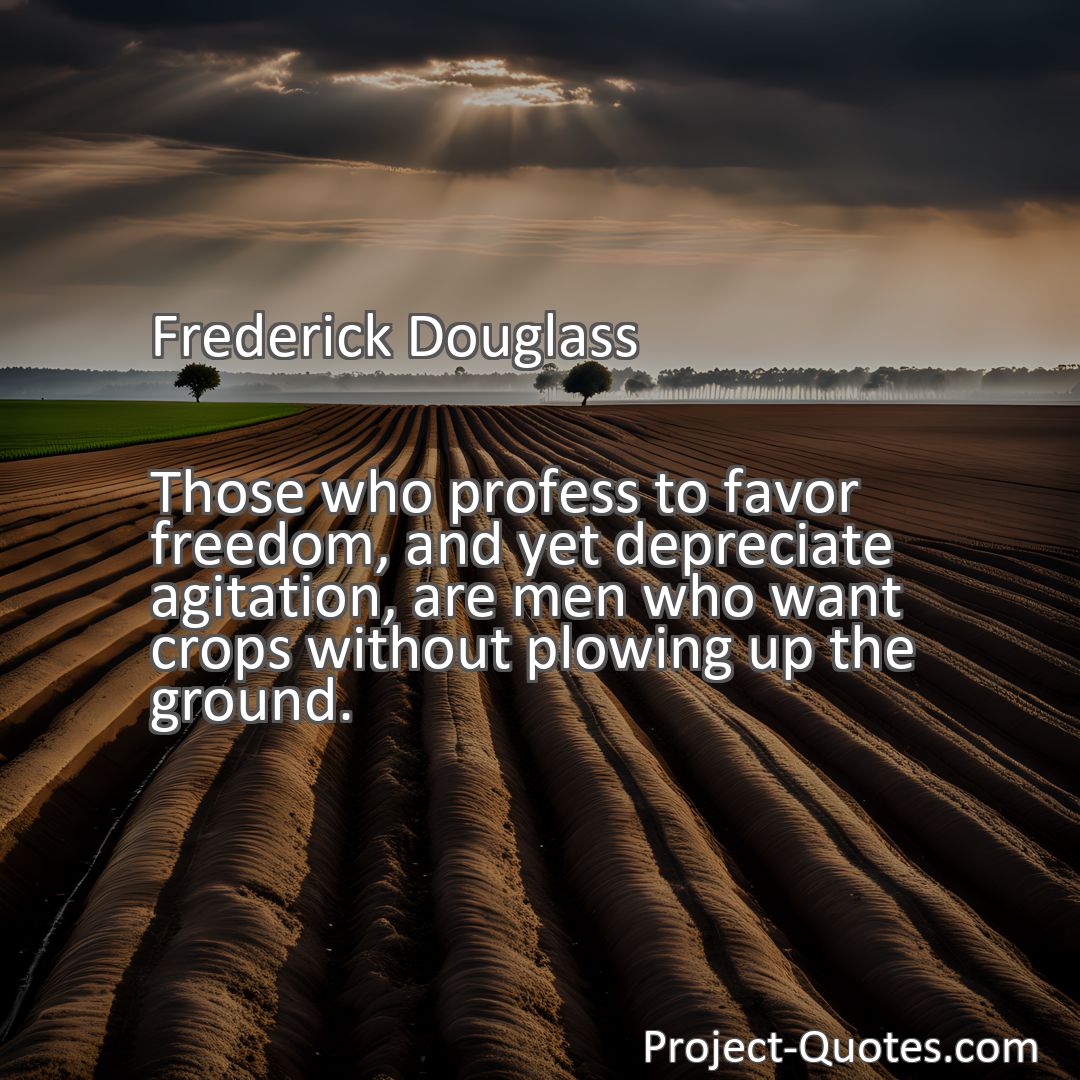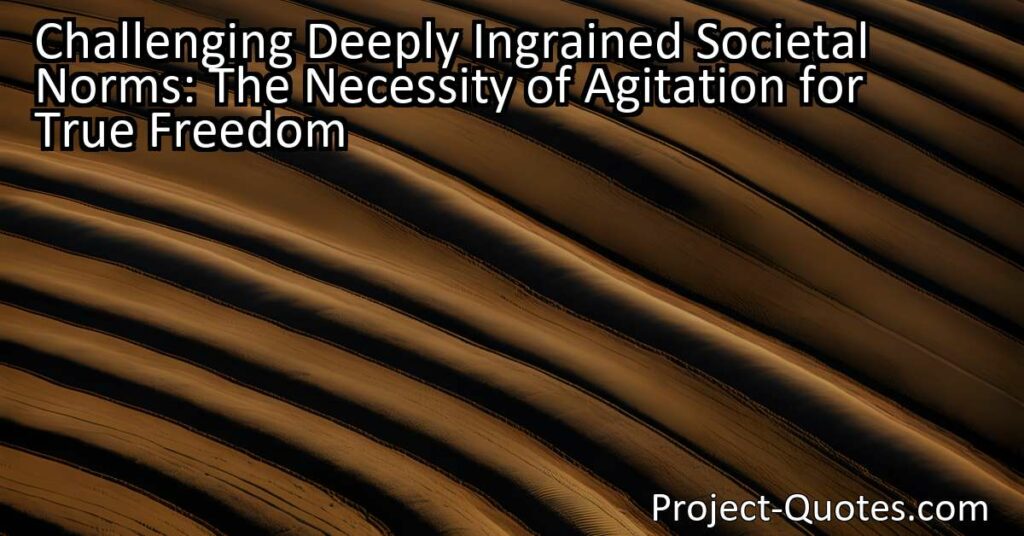Those who profess to favor freedom, and yet depreciate agitation, are men who want crops without plowing up the ground.
Frederick Douglass
Challenging deeply ingrained societal norms was necessary for the abolition of slavery. Frederick Douglass, a prominent advocate for freedom, highlighted the importance of agitation and upheaval to address the injustices that hinder true freedom. By confronting the existing order and engaging in discomforting conversations and protests, progress in the fight against slavery was made.
Table of Contents
- 1 Those who profess to favor freedom, and yet depreciate agitation, are men who want crops without plowing up the ground.
- 2 Frederick Douglass
- 3 Meaning of Quote – Those who profess to favor freedom, and yet depreciate agitation, are men who want crops without plowing up the ground.
- 4 Freely Shareable Quote Image
- 5 Related
Meaning of Quote – Those who profess to favor freedom, and yet depreciate agitation, are men who want crops without plowing up the ground.
In the words of renowned social reformer Frederick Douglass, “Those who profess to favor freedom, and yet depreciate agitation, are men who want crops without plowing up the ground.” This quote embodies the idea that true freedom cannot be achieved without undergoing the necessary struggle and upheaval. Douglass was a vocal advocate for the abolition of slavery in the 19th century United States, and his words continue to resonate today.
When Douglass speaks of those who “depreciate agitation,” he refers to individuals who shy away from conflict and activism, yet claim to support freedom. These people often prefer the comfort and convenience of the existing status quo, rather than confronting the daunting task of addressing the injustices that hinder true freedom. Douglass, however, recognizes that true progress can only be achieved by challenging and overturning oppressive systems.
In order to fully understand the significance of Douglass’ quote, it is essential to recognize the historical context in which he lived. Born into slavery, Douglass experienced firsthand the brutalities and injustices inflicted upon enslaved Africans. After escaping to the North, he became a prominent abolitionist, using his eloquence and personal experiences to expose the horrors of slavery.
During Douglass’ era, the institution of slavery was widely accepted in many parts of the United States. Slavery had become deeply rooted in the nation’s economy and was defended by those who stood to benefit from it. Consequently, advocating for the abolition of slavery required challenging deeply ingrained societal norms and confronting those in power who benefited from the institution.
Douglass’ reference to “crops without plowing up the ground” is a powerful metaphor that highlights the necessity of disturbing the existing order to achieve freedom. Just as a farmer must till the soil and uproot the weeds to yield a bountiful harvest, society must engage in agitation and upheaval to eradicate the deeply entrenched systems of oppression and discrimination.
Throughout history, those who have fought for freedom and social justice have been met with resistance and backlash. In the face of such opposition, it is tempting for some to gravitate towards a more comfortable path, to remain silent and avoid confrontation. However, Douglass challenges this complacency, asserting that those who genuinely value freedom must be willing to face the difficulties that come with agitation.
Agitation is often seen as disruptive, unsettling, and even dangerous. It involves challenging existing power structures, questioning societal norms, and demanding change. It requires uncomfortable conversations, protests, and active engagement in dismantling unjust systems. However, Douglass suggests that without this necessary agitation, true freedom and progress cannot be achieved.
The words of Frederick Douglass have relevance beyond the historical fight against slavery. They serve as a reminder that the struggle for freedom is ongoing and that progress comes at a cost. In contemporary society, there are numerous issues that demand agitation and confrontation: racial inequality, gender discrimination, environmental degradation, and socioeconomic disparities, to name a few.
In the face of these challenges, Douglass’ words compel us to examine our own beliefs and actions. Are we merely paying lip service to the idea of freedom while actively avoiding the necessary agitation for change? Do we truly value the principles of justice, equality, and liberty, or do we shy away from the difficult work needed to achieve these ideals?
Douglass challenges us to consider the inherent contradictions in claiming to support freedom while rejecting agitation. He acknowledges that change can be uncomfortable, even painful at times, but argues that this discomfort is a necessary aspect of growth and progress. By avoiding agitation, one effectively perpetuates the very systems of oppression and injustice they claim to oppose.
It is important to recognize that agitation does not necessarily equate to violence or destruction. While protests and demonstrations are often associated with the term, agitation can also manifest in peaceful means such as civil disobedience, grassroots organizing, and advocating for legislative change. These forms of agitation are indispensable tools for bringing about societal transformation without resorting to violence.
In conclusion, Frederick Douglass’ quote holds a timeless truth: those who profess to favor freedom, yet devalue agitation, are akin to individuals who want crops without plowing up the ground. Douglass challenges us to recognize that true freedom and progress require stepping out of our comfort zones and confronting the injustices that impede it. He reminds us that the struggle for freedom is ongoing and demands active engagement, even when it is uncomfortable or inconvenient. Let us embrace the words of Frederick Douglass and commit ourselves to the necessary agitation that is required to cultivate a society rooted in justice, equality, and liberty.
I hope this quote inspired image brings you hope and peace. Share it with someone who needs it today!


